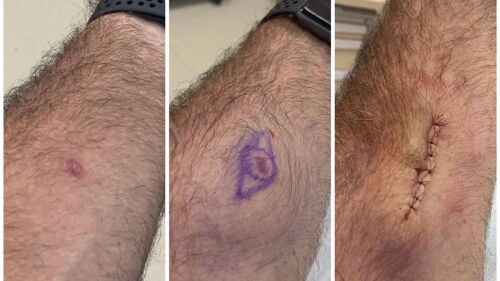By Namu Sampath
masslive.com
CHICOPEE, Mass. — There was only one reason why Capt. Zachary Vozella, 43, of the Chicopee Fire Department signed up for an early cancer screening.
“I know (cancer) is a risk of the occupation,” he said in an interview. “There was no other reason for me to get screened.”
The firefighter of 12 years had received an email from the Department of Fire Services about free early screening for cancer, and he decided to get an ultrasound.
The Department of Fire Services already offered firefighters in the state CT chest scans, screenings to detect skin cancer and blood tests that search for signs of prostate cancer through the Massachusetts Firefighting Academy. Starting last year, eligible firefighters could also get mammograms and ultrasounds, the department said in a press release.
On June 13, Vozella was screened at Springfield’s Mercy Medical Center. It turned up a mass on his left kidney.
“They said that the ultrasound showed something concerning, a neoplasm and that I should get it checked out,” Vozella said in a statement in a Department of Fire Services press release. “I was scared. I was nervous. It was nerve-wracking.”
A week and a CT scan later came the diagnosis: renal cell carcinoma.
In July, less than a month after his first screening, Vozella went in for surgery to get his kidney removed.
“I was shocked,” said Chicopee’s fire chief, Daniel Stamborski. “He’s (middle-aged), younger than me, but he appears to be young and healthy. Zach said he never experienced any symptoms.”
Cancer is a leading cause of death in firefighters, according to the Centers for Disease Control and Prevention.
Firefighters are 9% more likely to get cancer and 14% more likely to die of cancer than the average person, according to Jake Wark, the public information officer for the Department of Fire Services.
Stamborski told The Republican that occupational cancer is a risk for firefighters, but it is also personal to him.
In 2007, Stamborski lost his father, Robert Stamborski, who was a Chicopee firefighter for almost three decades, to bladder cancer.
“We took him to Dana Farber in Boston,” Stamborski said. “The doctors told us that diesel emissions have a direct link to bladder cancer.”
Through the Department of Fire Services, where Vozella received his free screening, Stamborski said he also attended cancer awareness classes and was able to teach his and other primary care physicians about the risks of being a firefighter.
“(The Department of Fire Services) is really good about sending out brochures to read, talking to people and encouraging people to get screened,” he said.
Then, the fire chief got screened himself, which is where he learned about an asthma diagnosis and an enlarged thyroid gland, due to exposure to carcinogens — both of which are under control, Stamborski said.
The primary difference between modern fires and those of years past are the types of buildings that firefighters go to today, Wark said.
“They’re filled with synthetics, plastics and batteries, all of which are carcinogens,” said Wark. “There are far fewer wood fires.”
Some of the ways firefighters can mitigate their exposure to carcinogens is by removing soot from their faces, necks, throats, underarms and other areas with a wipe; cleaning gear immediately after use; and showering immediately after a fire, Wark said.
In August, Gov. Maura Healey signed a bill that will phase out the use of PFAS, also known as “forever chemicals,” in firefighters’ personal protective equipment.
The chemicals were used in gear because of their ability to withstand heat and prevent the penetration of water and oil, according to a press release from the Governor’s Office, but research has shown that it is a common cause for cancer.
Vozella returned back to work on Sept. 27.
“We were thrilled to see him back, and I know his family is too. He’s got a young son,” Stamborski said.
When asked what advice he’d give his fellow firefighters, Vozella said: “Be proactive with your health, understand the risks of the job and be your own advocate with your doctors.”
©2024 Advance Local Media LLC.
Visit masslive.com.
Distributed by Tribune Content Agency, LLC.


















